Prime
Why traffic jam gets worse when it rains

Nicholas Sengoba
What you need to know:
- Driving to town. When it rains, the bank teller who serves you with a smile, will avoid arriving at work all wet and with muddy high heels or shoes. So instead of parking in the neighbourhood and walking on the dirty road to the taxi or bus stop, or taking a boda boda in the rain, they bite the bullet and drive their cars right into town.
Recently, we got stuck in Kampala’s infamous traffic jam, taking four hours on a journey that ordinarily would require 20 minutes. As we waited impatiently, someone on radio was pointing out that this was a sign of “economic prosperity”. That Ugandans were so rich they were buying more cars.
According to statistics, Uganda registers between 1,500 and 2,000 vehicles and puts them on the road every month. Nearly 95 per cent of these are relatively cheaper second-hand vehicles from Japan that set back owners by a minimum of Shs15 million.
Pro-government analysts are quick to point out to the Opposition that this puts to shame their claim that the government is presiding over a “failed economy”. Their point is justified by the fact that it is very prestigious to own a vehicle in most parts of Africa for it shows one has scaled the economic heights.
But in Uganda, where there is ubiquitous State failure, owning a car is a necessary evil. A family car may serve as an ambulance to rush a patient to a health centre and onto a referral hospital in the absence of a working ambulance service.
Because the public transport system is underdeveloped or non-existent all together, it is cheaper if one is travelling with the family to use a private car to go up-country, go shopping or to a social function like a wedding or church on Sunday.
So it is not exactly true that one must be economically comfortable to own a car. The peer pressure and lack of social amenities may force one to do so. That said, the easiest part of owning a car is buying one. After that, the realities set in. It has to be fuelled and maintained and that costs a fortune. Its safety is also another matter to factor in. Then there is the question of where to park it when one comes to the central business district plus the cost of parking space.
So for most people after buying the car, it is kept for emergency, only driven when one can’t avoid it. Many salary earners in Kampala, especially those who stay in the suburbs, drive the family vehicle from home in the morning dropping off the children at a school in the neighbourhood. Some with children who study at schools very near Kampala pay a monthly fee for school shuttle services - to pick and drop off the children conveniently.
The car owners then drive to a car park, petrol station or washing bay near the main road and leave the car there for the whole day. Then it is into a taxi or bus or even onto a boda boda to the centre of Kampala near the workplace.
Here one saves on time in case of the traffic jam, fuel whose prices are ever shooting up and parking fees plus the headache of searching for a slot by the road side. One does not also worry so much about car parts thieves breaking into and vandalising their vehicles.
Others may even ‘save’ by not bothering to replace worn tyres or pay third party insurance for these vehicles that never come within distance of traffic policemen in town!
Many people who work in Kampala live far out of the city where rent and the price of land is cheaper. The down side of living out of Kampala is that social amenities, especially roads, are poor. In fact most may not be paved.
So when it rains, the bank teller who serves you with a smile, will avoid arriving at work all wet and with muddy high heels or shoes. So instead of parking in the neighbourhood and walking on the dirty road to the taxi or bus stop, or taking a boda boda in the rain, they bite the bullet and drive their cars right into town.
That is why when it rains, Kampala ends up locked down in a traffic jam because every Tom, Dick and Harry has gone against their money saving scheme of not driving to town, pulled out their wheels and hit the road.
Nicholas Sengoba is a commentator on political and social issues.
[email protected]
Twitter: @nsengoba




